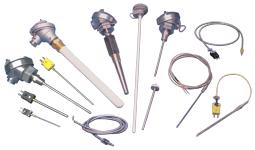
A thermocouple is a temperature sensor (electrical device) used to measure temperature. It comprises two types of metal which are joined together at one end forming a junction. When the junction is cooled or heated it produces a so-called “temperature-dependent voltage” which is used to measure temperature.
Said in another way, a thermocouple is a very simple, robust and inexpensive sensor for temperature measurement which is used in a variety of processes for measuring temperature.
They can be also produced in a large number of styles. For instance, thermocouple probes with connectors, bare wire thermocouples, thermocouple probes and more.
Thermocouples for Low Temperature
If low temperatures need to be measured Type T, N, K and E thermocouples can be used successfully to do the job. They can be used to measure temperatures down to -200°C.
Thermocouples for Molten Metal
Molten metal temperature measurement is very difficult, because of the severe conditions and very high temperature. Therefore, for that purpose only Type N and K Base Metal and Types S, R and B Platinum thermocouples can be used.
Thermocouples for Food Applications
Specifically for the food industry, thermocouples can be used in a large array of applications. Some of the most popular sensors and applications include Penetration probes, Clean-in-place sensors, Hotplate control, Food chain monitoring, and Oven control.
Thermocouples for Furnaces
When choosing a thermocouple for a furnace, you need
to keep in mind the conductions. Therefore, when you
want to select the right thermocouple for your
furnace, please do not forget to consider the
following conditions:
1. Temperature capability of the sheath or protective
covering.
2. The mounting configuration.
3. The atmosphere will be used.
4. Temperature capability of the thermocouple wires.

B-Type Thermocouple
Type B thermocouple comprises of Platinum (30% Rhodium) and Platinum (6% Rhodium) alloy. It has a high-temperature range between 1370 to 1700 °C, making it suitable for applications with very high temperatures like glass production.
E-Type Thermocouple
Type E thermocouple comprises Chromel and Constantan alloys. It has a lower temperature range than type B (0 to 870 °C). They can be used in an inert environment, but they need to be protected against a sulphurous environment. Type E thermocouples are mostly used in power plants.
J-Type Thermocouple
Type J thermocouple comprises of Iron and Constantan. It has a low-temperature range of 0 to 760 °C. This type of thermocouple is used primarily in inert and vacuum environments. One of the most common applications is Injection moulding.
K-Type Thermocouple
Type K thermocouple is made of Chromel and Alumel. It has a temperature range between 95 and 1260 °C. It is best suited for neutral or oxidising environments and is mostly used in refineries.
N-Type Thermocouple
The alloys used for type N thermocouples are Nicrosil and Nisil. Its temperature range is between 650 to 1260 °C. The unique point of this type of thermocouple is that it offers high resistance to degradation due to green rot and hysteresis. Generally, type N thermocouples are used in petrochemical and refineries industries.
R-Type Thermocouple
Type R thermocouples comprise of a combination of Platinum (13% Rhodium) and Platinum and have a temperature range between 870 to 1450 °C. Due to the fact that they are very stable and accurate, they are used in Sulphur recovery units.
S-Type Thermocouple
Type S thermocouples are a mixture of Platinum (10% Rhodium) and Platinum. They have a higher temperature range between 980 to 1450 °C making them perfect for applications involving high temperatures.
T-Type Thermocouple
Last but not least, type T thermocouple comprises Copper and Constantan. The temperature range it has is between -200 to 370°C. It is suitable for inert and vacuum environments, making it perfect to be used in cryogenics and food production.

